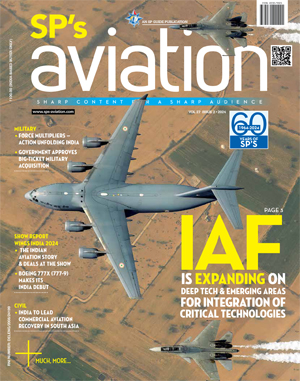INDIAN ARMED FORCES CHIEFS ON
OUR RELENTLESS AND FOCUSED PUBLISHING EFFORTS

SP Guide Publications puts forth a well compiled articulation of issues, pursuits and accomplishments of the Indian Army, over the years

I am confident that SP Guide Publications would continue to inform, inspire and influence.

My compliments to SP Guide Publications for informative and credible reportage on contemporary aerospace issues over the past six decades.
Air India - Asset or Liability?
In the last week of June this year, the Union Cabinet accorded approval to the proposal for disinvestment in the national carrier and its five subsidiaries

The fate of the national carrier Air India has not only drawn considerable media attention during the last one month or so, it has also been a subject under active consideration by the government. The National Institution for Transforming India (NITI) Aayog, a policy think-tank of the Government of India, has recommended total privatisation of the state-owned carrier as in their view, Air India is languishing under a crushing debt burden of Rs. 52,000 crore and this is only expected to increase further by approximately Rs. 4,000 crore every year. The NITI Aayog is of the firm belief that the government is not in a position to sustain this huge financial burden any longer. Besides, it is not fair to keep the national carrier afloat on the tax payer's money. Apart from the debt liability, the national carrier owes around Rs. 1,200 crore to its pilots, cabin crew and other ground staff that number around 27,000. This financial liability is on account of salary cuts imposed by the national carrier as part of its effort to cope with financial distress. It would be logical as well as necessary for the national carrier to clear the dues of their employees before it is privatised. Otherwise, agitation by the employees itself could be an impediment in the process of privatisation.
The Centre for Asia Pacific Aviation, a consultancy firm of global repute specialised in the airline industry, in a report on the national carrier said, “Subsidising Air India to the tune of hundreds of millions of dollars a year is neither sustainable nor desirable for a government which has so many other pressing economic commitments and social priorities.” Successive governments in the past have been seized of the problem, but rather unfortunately, have not been able to do anything to solve the problem. The ailing national carrier has thus been the proverbial millstone around the neck of not only the Indian airline industry, but of the nation itself.
In the last week of June this year, the Union Cabinet accorded approval to the proposal for disinvestment in the national carrier and its five subsidiaries namely Air India Engineering Services, Air India Transport Services, Air India Charters, Hotel Corporation of India and Air India-Singapore Airport Terminal Services. However, this was only an “in principle” approval by the government and the modalities including the size of disinvestment and the road map for the exercise, has been left to a Group of Ministers under the Ministry of Civil Aviation (MoCA) to finalise.
As per PricewaterhouseCoopers, a global consultancy firm, acquisition of Air India ought to be an attractive option for existing airlines as well as new entrants as it has enormous assets by way of real estate, 120 airliners on its inventory and 43 on order as replacements. It has an extensive operating network with 15 per cent domestic and around 17 per cent international market share. However, there does not appear to be much excitement in both the domestic and global markets on this offer.
As per Jayant Sinha, Minister of State for Civil Aviation, there are a number of agencies both domestic and international that have shown interest in this investment opportunity. However, so far, IndiGo Airlines is the only one that has submitted its offer through a written communication to the MoCA. IndiGo has indicated that it would be interested in buying only the international operations of Air India along with India Express and in case this option was not available, they would consider complete acquisition of the airline. There were rumours that the Tata Group had met with senior functionaries at the MoCA and had expressed interest in acquiring the national carrier. SpiceJet is apparently not keen on buying out Air India at present, as it is “not strong enough financially to take on a gamble” even though he considered Air India as a lucrative asset.
The somewhat subdued response to the offer for disinvestment in or sale of stake in Air India, is not surprising. A similar scheme floated during the tenure of the Atal Bihari Vajpayee government, did not elicit any response. In the current scenario, there is strong opposition from the employees unions of the airline that enjoy political support from the left parties.
Unless the government successfully addresses the wide range of impediments and especially the huge liabilities the airline is burdened with, once again the effort to privatise the national carrier may turn out to be a damp squib.





